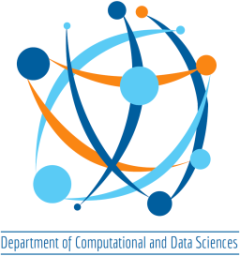Department of Computational and Data Sciences
Scalable Systems for Data Science
- Instructors: Yogesh Simmhan (email)
- TA: Aakash Khochare (email)
- Course number: DS256
- Credits: 3:1
- Semester: Jan, 2018
- Lecture: Tue/Thu 330-5PM
- Room: CDS 202
- Pre-requisites: Data Structures, Programming and Algorithm concepts. Programming experience required, preferably in Java.
- First class on Tue, Jan 9 at 330pm at CDS202
- Register for Course Online using IISc AcadServer
- See 2017 webpage
Overview
This course will teach the fundamental Systems aspects of designing and using Big Data platforms, which are a specialization of scalable systems for data science applications. This course will address three facets of these platforms.
- The design of distributed program models and abstractions, such as MapReduce, Dataflow and Vertex-centric models, for processing volume, velocity and linked datasets, and for storing and querying over NoSQL datasets.
- The approaches and design patterns to translate existing data-intensive algorithms and analytics into these distributed programming abstractions.
- Distributed software architectures, runtime and storage strategies used by Big Data platforms such as Apache Hadoop, Spark, Storm, Giraph and Hive to execute applications developed using these models on commodity clusters and Clouds in a scalable manner.
It will cover topics on: Why Big Data platforms are necessary? How they are designed? What are the programming abstractions (e.g. MapReduce) that are used to compose data science applications? How the programming models are translated to scalable runtime execution on clusters and Clouds (e.g. Hadoop)? How do you design algorithms for analyzing large datasets? How do you map them to Big Data platforms? and How can these be used to develop Big Data applications in an integrated manner?
Several key and contemporary research papers will be discussed as part of the course. paper As part of a hands-on Project in this course, students will work with real, large datasets and commodity clusters, and use scalable algorithms and platforms to develop a Big Data application. The emphasis will be on designing applications that show good “weak scaling” as the size, speed or complexity of data increases, and using distributed systems such as commodity clusters and Clouds.
Besides class lectures, there will be several guest lectures by experts from the Industry who work on Big Data platforms, Cloud computing and data science.
This course extends from the systems basics introduced in the DS 221: Introduction to Scalable Systems course at CDS, and is complementary to the DS 222: Machine Learning with Large Datasets is offered in the Aug term. This course also complements other breadth courses on data science like the E0 229: Foundations of Data Science and E0 259: Data Analytics.
Intended Learning Objectives
At the end of the course, students will have learned about the following concepts.
- Types of Big Data, Design goals of Big Data platforms, and where in the systems landscape these platforms fall.
- Distributed programming models for Big Data, including Map Reduce, Stream processing and Graph processing.
- Design of and development on Big Data platforms and their optimizations on commodity clusters and Clouds.
- Scaling data Science algorithms and analytics using Big Data platforms.
Pre-requisites
This is an introductory course on platforms and tools required to develop analytics over Big Data. However, it builds upon prior knowledge that students have on computing and software systems, programming, data structures and algorithms. Students must be familiar with Data Structures (e.g. Arrays, Queues, Trees, Hashmaps, Graphs) and Algorithms (e.g. Sorting, Searching, Graph traversal, String algorithms, etc.).
It is recommended that students have good programming skills (preferably in Java) which is necessary for the programming assignments and projects. Familiarity with one or more of the following courses will also be helpful (although not mandatory): DS 292 (HPC), DS 295 (Parallel Programming), E0 253 (Operating Systems), E0 264 (Distributed Computing Systems), SE252 (Introduction to Cloud Computing), E0 225 (Design and Analysis of Algorithms), E0 232 (Probability and Statistics), E0 259 (Data Analytics).
Assessment
The total assessment score for the course is based on a 1000 point scale. Of this, the weightage to different activities will be as follows:
| 45% Homework | Two programming assignments (50+2*200 points) |
| 20% Project | One final project, to be done individually or in teams (200 points) |
| 30% Exams | One Final exam (300 points) |
| 5% Participation | Participation (i.e. not just “attendance”) in classroom discussions and online forum for the course (50 points) |
Academic Integrity
Students must uphold IISc’s Academic Integrity guidelines. We have a zero-tolerance policy for cheating and unethical behavior in this course and failure to follow these guidelines will lead to sanctions and penalties. This includes a reduced or failing grade in the course, and recurrent academic violations will be reported to the Institute and may lead to an expulsion.
Learning takes place both within and outside the class. Hence, discussions between students and reference to online material is encouraged as part of the course to achieve the intended learning objectives. However, while you may learn from any valid source, you must form your own ideas and complete problems and assignments by yourself. All works submitted by the student as part of their academic assessment must be their own.
- Plagiarism
- Verbatim reproduction of material from external sources (web pages, books, papers, etc.) is not acceptable. If you are paraphrasing external content (or even your own prior work) or were otherwise influenced by them while completing your assignments, projects or exams, you must clearly acknowledge them. When in doubt, add a citation!
- Cheating
- While you may discuss lecture topics and broad outlines of homework problems and projects with others, you cannot collaborate in completing the assignments, copy someone else’s solution or falsify results. You cannot use notes or unauthorized resources during exams, or copy from others. The narrow exception to collaboration is between team-mates when competing the project, and even there, the contribution of each team member for each project assignment should be clearly documented.
- Classroom Behavior
- Ensure that the course atmosphere, both in the class, outside and on the online forum, is conducive for learning. Participate in discussions but do not dominate or be abusive. There are no “stupid” questions. Be considerate of your fellow students and avoid disruptive behavior.
Resources
- Select chapters from:
- Mastering Apache Spark 2 (Spark 2.2+), Jacek Laskowski
- Spark Internals, Jerry Lead
- Mastering Apache Storm, Ankit Jain, Packtpub, 2017
- Data-Intensive Text Processing with MapReduce, Jimmy Lin and Chris Dyer, 1st Edition, Morgan & Claypool Publishers, 2010
- Mining of Massive Datasets, Jure Leskovec, Anand Rajaraman and Jeff Ullman, 2nd Edition (v2.1), 2014.
- Online documentation
- Current literature
- Online Forum: ds256-2018-jan@iisc.ac.in group on O365
- Cluster Access: Students will validate their assignments and projects on the CDS
turingcluster, and Cloud resources. Details for accessing the cluster and running programs on it will be covered in a lab session.- Spark on turing
- Storm on turing
- Hadoop on turing
Teaching & Office Hours
- Lecture: Tue/Thu 330-5PM, CDS 202 (Yogesh)
- Office Hours: By appointment
Tentative Schedule
- First Class on Jan 9
- Assignment 0 (5%)
- Processing large data volumes (~8 lectures)
- GFS/HDFS [Slides]
- The Google file system, Sanjay Ghemawat, Howard Gobioff, and Shun-Tak Leung, ACM Symposium on Operating systems principles (SOSP), 2003
- The Hadoop Distributed File System, Konstantin Shvachko, Hairong Kuang, Sanjay Radia, Robert Chansler, IEEE Symposium on Mass Storage Systems and Technologies (MSST), 2010
- MapReduce [Slides]
- MapReduce: Simplified Data Processing on Large Clusters, Jeffrey Dean and Sanjay Ghemawat, Usenix Symposium on Operating System Design and Implementation (OSDI), 2004
- Spark RDD & Programming [Slides]
- Spark: Spark: Cluster Computing withWorking Sets, Matei Zaharia, Mosharaf Chowdhury, Michael J. Franklin, Scott Shenker, Ion Stoica, USENIX HotCloud 2010
- Resilient Distributed Datasets: A Fault-Tolerant Abstraction for In-Memory Cluster Computing, Matei Zaharia, Mosharaf Chowdhury, Tathagata Das, Ankur Dave, Justin Ma, Murphy McCauley, Michael J. Franklin, Scott Shenker, Ion Stoica, USENIX NSDI 2012
- Spark Internals [Slides]
- Assignment 1 (20%)
- GFS/HDFS [Slides]
- Distributed Consistency
- Global Snapshots [Slides]
- Distributed Snapshots: Determining Global States of a Distributed System, K. Mani Chandy and Leslie Lamport, ACM Transactions on Computer Systems, 1985 ***
- CAP theorem [Slides]
- CAP Twelve Years Later: How the “Rules” Have Changed, Eric Brewer, IEEE Computer, 2012 ***
- Perspectives on the CAP Theorem, Seth Gilbert & Nancy A. Lynch, IEEE Computer, 2012 ***
- Dynamo DB [Slides]
- Dynamo: Amazon’s highly available key-value store, DeCandiaG, HastorunD, JampaniM, KakulapatiG, LakshmanA, PilchinA, SivasubramanianS, VosshallP, VogelsW. ACM SIGOPS symposium on Operating systems principles (SOSP), 2007
- Global Snapshots [Slides]
- Processing fast data streams
- Apache Storm [Slides]
- Storm @twitter. Ankit Toshniwal, et al. In ACM SIGMOD 2014
- R-storm: Resource aware scheduling in Storm, B Peng, et al, Middleware 2016 ***
- Model -driven driven Scheduling for Distributed Stream Processing Systems, Shukla et. al. JPDC 2017 ***
- Assignment 2 (20%)
- Apache Storm [Slides]
- Processing linked data & graphs [Slides]
- Pregel: A System for Large-Scale Graph Processing, Malewiz, et al, SIGMOD, 2010
- Guest lectures
- Final exam (30%)
- Project presentation (20%)
Assignments
- Assignment 0
- v1: [ds256.2018.A0_v1.txt] (Posted on Jan 16, 2018)
- 50 points. Due on Jan 26, 2018 11:59PM.
- Watch out for updates on datasets, running spark on turing, submission instructions, etc.
Papers
Project Topics
- TBD
Public Datasets
- Microsoft Data Science for Research: Dataset directory
- …




